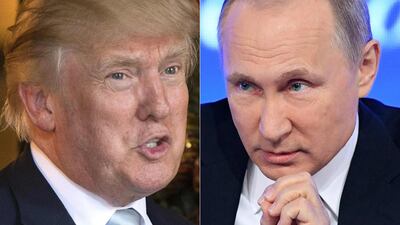New York // Less than two weeks before Donald Trump is sworn in as the 45th president of the United States he remains locked in an unprecedented battle with his own country’s intelligence chiefs over Russian hacking of the election.
Mr Trump and his aides are refusing to acknowledge that Vladimir Putin authorised cyberattacks to help his preferred candidate, as questions swirl about the legitimacy of the result.
Instead, the president-elect is blaming the victim, insisting that both sides in the presidential election were attacked but that Republican defences were stronger than those of his rival Hillary Clinton’s Democratic party.
On Saturday, he returned to the issue once again with a series of tweets: “Only reason the hacking of the poorly defended DNC is discussed is that the loss by the Dems was so big that they are totally embarrassed!”
His aides have also used television news channels to vigorously refute evidence that Mr Trump had a helping hand from Russia, amid fears that his presidency could be compromised.
But with no smoking gun — evidence that Trump aides knew of the hacking or that it affected the election outcome — there remains no suggestion his win could be overturned or that the scandal could yet prove a fatal blow. Instead, analysts say it is the billionaire’s confrontational approach that is keeping doubts about his election in the headlines and creating powerful enemies within his own intelligence agencies.
“It’s going to certainly continue the questions about his victory. I don’t think that’s anything that’s going away any time soon,” said Jeanne Zaino, a professor of political science at Iona College in New York.
On Friday the president-elect was briefed on an intelligence report which concluded that the Russian president sought to help Mr Trump win the election.
A 25-page unclassified version of the findings was released later in the day.
“Putin and the Russian government aspired to help president-elect Trump’s election chances when possible by discrediting secretary Clinton and publicly contrasting her unfavourably to him,” it said, in strikingly pointed language.
For weeks Mr Trump has displayed his hallmark bombast in dismissing the allegations and mocking American intelligence agencies.
This time, however, he praised their efforts in a written statement and highlighted their finding that the interference did not affect the result of the election.
“While Russia, China, other countries, outside groups and people are consistently trying to break through the cyber infrastructure of our governmental institutions, businesses and organisations including the Democrat National Committee, there was absolutely no effect on the outcome of the election including the fact that there was no tampering whatsoever with voting machines,” he said.
On Saturday he also named Dan Coats, a former member of the senate intelligence committee, as national intelligence director. The appointment of such a conventional figure, and a past critic of Russia, may ease concerns about rifts between president and spy agencies.
Earlier, Leon Panetta, the former CIA director, said it was unprecedented for a president-elect to undermine his own intelligence officers with public comments.
"The president has to work with the intelligence community. He has to take tough decisions," he told NBC's Today show. "I'm concerned that it really is damaging the credibility of our intelligence agencies and the morale of those men and women who serve in our intelligence agencies."
Republicans also expressed concern that Mr Trump’s vigorous style may have helped win the election but will backfire in office.
John Weaver, who worked for John Kasich's failed presidential campaign, told The New York Times: "I don't think what worked in a campaign against Jeb Bush is really going to work when you are dealing, you know, with the combined power of the CIA, NSA and the FBI."
Prof Zaino added that the real winner so far was Mr Putin.
“Regardless of what happened, the benefits to him are tremendous,” she said. “He looks as if he has magically been able to influence the United States election process, the intelligence community is in disarray, there are disagreements between the incoming administration and the Obama administration, everybody is pointing fingers at everyone else.”
Meanwhile, Barack Obama has intervened with a call for unity.
In an interview with ABC News to be broadcast on Sunday, he said: “One of the things I am concerned about is, the degree to which we’ve seen a lot of commentary lately where there are Republicans or pundits or cable commentators who seem to have more confidence in Vladimir Putin than fellow Americans because those fellow Americans are Democrats. That cannot be.”
foreign.desk@thenational.ae

